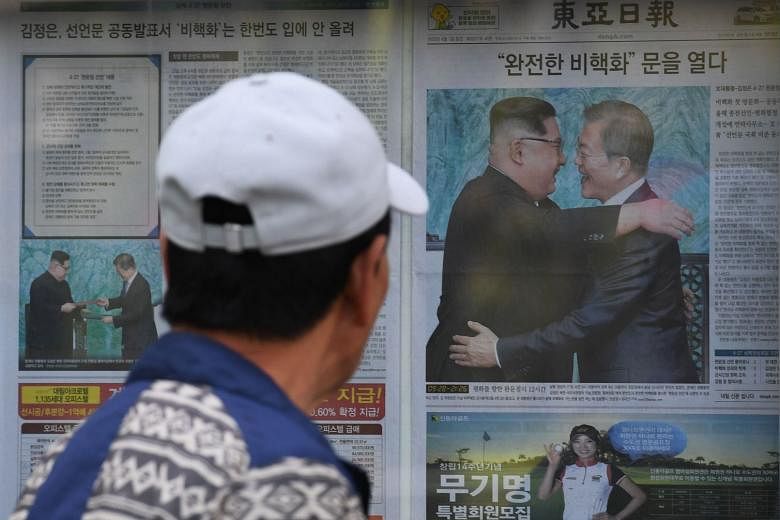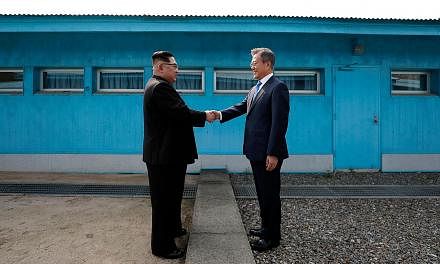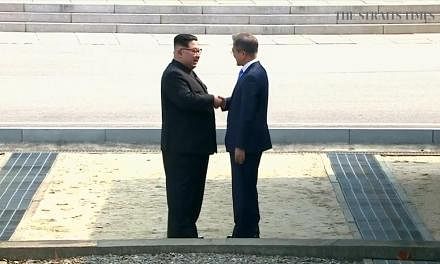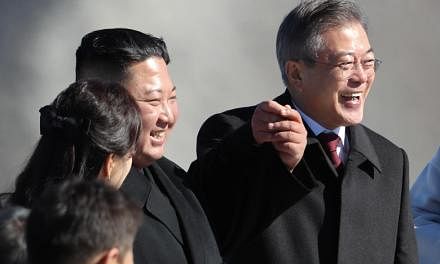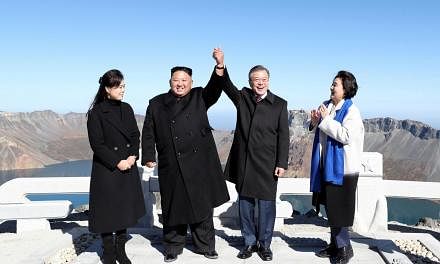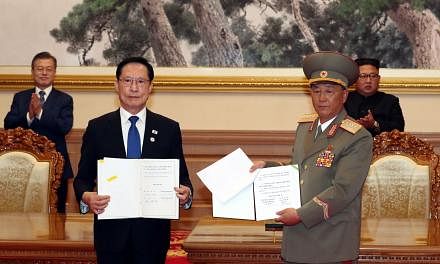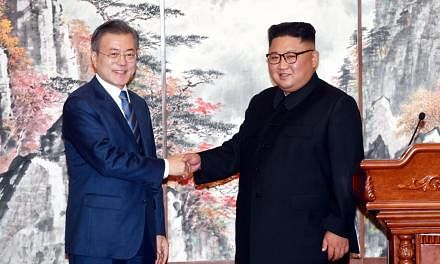SEOUL -North Korea's leader Kim Jong Un and South Korean President Moon Jae In met in the Demilitarised Zone on Friday and agreed to pursue a permanent peace treaty and the complete denuclearisation of their divided peninsula.
"South and North Korea confirmed the common goal of realising, through complete denuclearisation, a nuclear-free Korean peninsula," the two Koreas said in a joint statement issued at the end of the third inter-Korean summit since end of the Korean War.
The Panmunjom Declaration also vows to "bring an end to the current unnatural state of armistice and establish a robust peace regime".
Here's a sampling of the views across north-east Asia on the historic summit, the third summit between both sides since 1953 and the first in 11 years.
SOUTH KOREA
JoongAng Ilbo
In an editorial headlined "A meaningful first step", the newspaper, one of the three biggest newspapers in South Korea, highlighted how the situation has changed drastically in a matter of a few months.
Around this time last year, concerns were high about a war on the Korean Peninsula. Just a few months ago, the leaders of the United States and North Korea were engaged in a contest over whose nuclear button was bigger and more powerful.
It said that the Panmunjom Declaration had three main agreements - improving inter-Korean relations, easing military tension and establishing peace.
"Denuclearisation was included as part of the move for peace, and its importance was weakened. Some say the agreement is unsatisfactory because a definite road map, including the method, subjects and timeline of denuclearisation, was not laid out. But that seemed necessary because a shining moment of dramatic progress must have been saved for the upcoming North-US summit.
" 'This is the beginning and the tip of the iceberg,' Kim Jong Un said, and that is also a hint. He probably gave serious thought to what to concede to the United States and what could be marked as a success at the inter-Korean summit," said the editorial.
"Denuclearization is destined to regress unless we progress. Without progress, we are only buying time for the North. The government must keep the sanctions, which forced the North to the table, and maintain cooperation with the United States. The government must commit all of its effort, for this may well be the last chance."
Korea Herald
One of the leading English-language newspapers in South Korea, the Korea Herald said in its editorial on Saturday (April 28) that the stipulation of the denuclearisation commitment in the joint declaration can be viewed as a positive start to the establishment of peace on the peninsula.
Considering the inter-Korean summit serves as a stepping stone to the Washington-Pyongyang summit, the historic South-North summit, held for the first time in the South, played its role quite successfully, the editorial said.
"Though the joint declaration did not outline a specific denuclearisation schedule, such as when they will complete denuclearisation of the peninsula and how to do it, the agreement to seek international cooperation regarding the matter can be read positively.
"Related concrete plans and measures only need to be worked out in the Trump-Kim summit and follow-up meetings."
"When it comes to the North's denuclearization commitment, the South is not without concern about the possibility of its flip-flop. However, unlike his late father, the North's former leader, Kim appeared surprisingly forward-looking regarding the matter...Scenes of Kim talking with Moon amicably have raised hopes for positive outcomes from the upcoming summit with the US," said th e daily.
Chosun Ilbo
The conservative Chosun Ilbo said in an editorial that the agreement was positive in terms of repairing frozen ties between the two Koreas but left much to be desired in terms of denuclearisation, reported Agence France Presse.
"This is one step back from what was agreed in 2005," it said in reference to an accord under which the North promised to abandon "all nuclear weapons and existing nuclear programmes" and allow outside inspectors in for verification.
"Even if an agreement is reached on denuclearising the North at the upcoming US-North Korea summit, it will take a while to demolish nuclear facilities, weapons and fissile materials," it added.
It noted Kim himself made no mention of denuclearisation in public.
The Hankyoreh
In an analysis piece headlined "Implementation of Panmunjeom Declaration will be a challenge", the left-leaning newspaper said on Saturday (April 27) it would be a challenge for President Moon to overcome political opposition to whatever was agreed at Friday's summit.
The leader of the main opposition Liberty Korea Party, Mr Hong Joon Pyo , has sharply criticised the outcome of the summit.
"They just wrote down what Kim Jong Un dictated. In the end this was nothing more than a charade of inter-Korean peace cooked up by Kim and the Moon administration," Mr Hong said.
The Blue House seeks to submit the inter-Korean agreements to the parliament for ratification to make their implementation legally binding, but the Hankyoreh article said the ratification by the National Assembly is expected to be an uphill slog.
"After South Korean President Moon Jae In and North Korean leader Kim Jong Un signed the Panmunjeom Declaration for Peace, Prosperity and Unification of the Korean Peninsula on April 27, one remaining challenge is the implementation of the agreement.
"One of the key questions is whether the declaration's legal force can be guaranteed by securing the ratification of the National Assembly...It has long been Moon's conviction that inter-Korean agreements should be made law to make their implementation legally binding. He is determined not to repeat the experience of the June 15 Joint Statement and Oct. 4 Summit Statement, which were signed during summits in 2000 and 2007 but fizzled out without being put into practice."
CHINA
Global Times
In an op-ed piece headlined "What can we read from the Panmunjom Declaration?", writer Jin Kai described the two Koreas as two blood-tied brothers that have diverged yet share so much.
The piece said that the specific clauses of the declaration convey several important messages.
"Above all, both sides affirmed 'the principle of determining the destiny of each Korean nation on their own'.
" This reminds us of the dark cloud that has been lingering over the Korean Peninsula for over a hundred years. And over the past year, the North has been struggling to guarantee the survival of its regime and maintain its dignity, particularly as a result of external sanctions, while the South has been scrambling to find its own pride as a self-dependent 'middle power' that can survive the long-existing and competing great powers in the region.
The piece said that the issue of a peace regime on the Korean peninsula has never been an "inter-Korean" matter.
"Thus, a suggestion on 'trilateral meetings involving the two Koreas and the United States, or quadrilateral meetings involving the two Koreas, the United States and China' was made by both sides in the declaration. Interestingly, the use of the word "or" could have been placed carefully and could have been a delicate choice, which indicates the strategic calculations by both sides in respect to the two leaders' understandings of China's role in the overall peace process on the Korean Peninsula."
The Global Times is a news outlet run by the ruling Communist Party's top propaganda organ.
China Daily
An editorial in the official China Daily on Saturday said denuclearisation could end hostilities between the two sides and"usher in a new era of development" on the peninsula, but noted Friday's declaration lacked a plan for achieving the goal.
"The denuclearisation of the peninsula, written into the Panmunjom Declaration, is only a prospect with no specific plan. That is because such specifics can be reached only between the US and North Korea, and South Korea has only limited authority to bargain," it said.
JAPAN
Kyodo news agency
Japan's news agency said in a piece headlined "N. Korea's denuclearisation elusive despite 'historic' summit" that the pathway towards ridding North Korea of its nuclear weapons remains elusive and that the inter-Korean summit offered little clues as to the degree of the North's denuclearisation commitment ahead of the first-ever talks between US and North Korean leaders.
It highlighted that in contrast to South Korean president Moon, Kim did not specifically refer to the word "denuclearisation" during their joint press conference, although he vowed to "thoroughly implement" the just-adopted Panmunjom Declaration aimed to ensure peace and prosperity of the peninsula.
Based on the live footage, Kim appeared to pay due respect to the South Korean president, who is around twice his age, and even communicated the outcome of the talks directly to the Western media, which is something previous North Korean rulers have never done.
"Until recently, Mr. Kim had been a figure veiled in secrecy and I think many had an image of him as a dictator who could go so far as executing his uncle. But in just one day, I think that image has completely changed (in a positive way)," Hideki Okuzono, a Japanese expert on Korean politics, told Kyodo.
"In the context of dealing with the United States, it is very important to win the support of the South Korean public, and North Korea's image strategy was quite skilful," he said.
Yomiuri Shimbun
The newspaper said in its editorial on Saturday (April 28) that a mood of conciliation stood out at the inter-Korean summit but warned against falling for Kim Jong Un's charm offensive.
"There is no doubt that North Korea intends to weaken sanctions pressure through a charm offensive and dialogue, while keeping its nuclear weapons," the editorial said.
"Pyongyang also appears to be aiming for rewards, such as an easing of sanctions and a guarantee of the existence of Kim's regime, in return for incremental dismantlement. The international community must stay alert. "
It also highlighted the importance of China keeping up its pressure on the North to ensure that North Korea restrain its provocations and shift to dialogue.
"China must maintain its restrictions on supplying energy to the North and accepting North Korean workers," it said.
In a separate news story published on Friday (April 27) evening, Yomiuri reported that the scene of the historic handshake between the leaders of North and South Korea was hailed by some North and South Koreans living in Japan.
They expressed hopes that the two Koreas will put an end to their long-standing confrontation, but there also remains deep-rooted scepticism over the meeting, according to the newspaper.
Koreatown in Osaka's Ikuno Ward became something of a venue for watching broadcasts of the meeting, reported Yomiuri Shimbun.
People there sang the Korean folk song "Arirang" when Mr Kim and President Moon shook hands.
